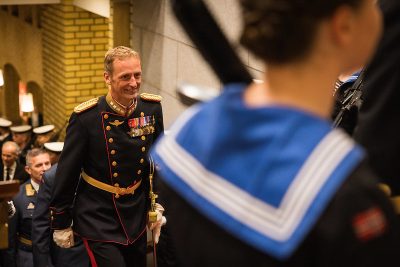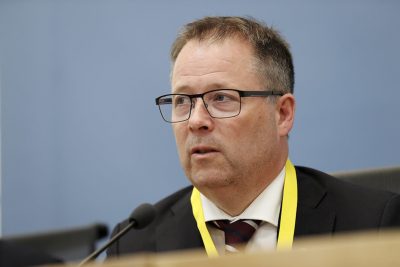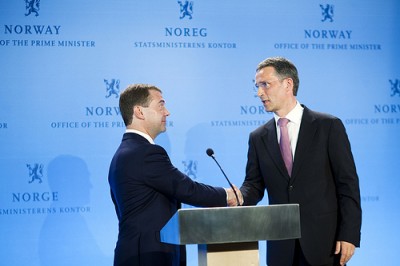Norway’s Defense Chief Eirik Kristoffersen is among the country’s few top officials who can smile after emerging as the clear winner in this year’s state budget battle. His armed forces stand to get the biggest budget increase (9.8 percent), in an effort to vastly improve national security.

It’s not only the crisis in Ukraine that’s costing a lot in terms of military assistance and contributions of weapons, to help Ukraine fend off Russia’s invasion. Russian President Vladimir Putin’s war on Ukraine has also highlighted severe shortcomings in Norway’s own domestic security and preparedness.
On the day before the government presented its state budget proposal for 2023 in Parliament, for example, came the latest findings of domestic defense negligence. The state auditor (Riksrevisjonen) unveiled “extremely serious weaknesses” in the information systems needed for various defense entities to communicate with one another. The report itself was classified but State Auditor Karl Eirik Schjøtt-Pedersen didn’t mince any words when describing the main problem: that the weaknesses “can have great consequences for national security.” He called the report “the most serious we have ever put forth.”
The various branches of the military “have over time not managed to realize efficient and secure information systems that support the defense establishment’s operative abilities,” reads the public summary of the audit, adding that the weaknesses in the security of the military’s command- and control systems put operative capability at risk.

Both Defense Minister Bjørn Arild Gram of the Center Party and Defense Chief Kristoffersen acknowledged the problems and admitted “a need for measures that can meet address these challenges.” Gram, who’s only held his post since last spring, has been been under increasing pressure to address the lack of security, amidst fears that it still may amount to too little too late.
Kristoffersen, meanwhile, told newspaper Aftenposten that he shared the state auditor’s concerns and admitted the current communications systems should have been replaced or improved long ago: “They’re only still functioning because of clever people, not good technology. It hasn’t improved since the state auditor examined them. On the contrary, the systems have only become older.”
‘It’s as bad as the state auditor says’
Kristoffersen, who took over as head of Norway’s armed forces in the spring of 2020, went on to say that he is “worried about (their) digital security. It’s as bad as the state auditor says,” he added, and can pose a threat to national security, “but we do what we can to operate it as securely as possible.” The defense forces’ ability to uncover and handle a digital attack, however, is limited.
The government has allocated more funding for cyber security and that’s due to be expanded. The problem extends back to the earlier Conservatives-led government, and the weaknesses within military communication come in addition to how Norwegian governments have been warned for many years about the need for other forms of security improvements as well:
*** Norway’s national security authority (NSM) warned as early as 2013, the year Conservatives leader Erna Solberg took over as prime minister, that the country’s oil and gas installations were “vital national infrastructure that should be secured.” Now the installations, especially Norway’s 8,800 kilometers of gas pipelines, have emerged as targets after suspected sabotage to pipelines in the Baltic Sea. Only now have defense forces been sent out to patrol them.
*** Norway’s police intelligence agency PST has also warned since at least 2014 about espionage that can be used to sabotage both civilian and military infrastructure. Both PST and Norway’s military intelligence agency E-tjenesten have also repeatedly singled out Russia and China as posing the greatest threats to Norwegian security.
*** PST further warned in 2020 about possible charting of Norway’s pipeline system that could be used for sabotage attempts. Newspaper Aftenposten reported last week about how Russian oil company Rosneft was allowed in 2012 to set up a subsidiary in Oslo (RN Nordic Oil) that quickly acquired access, along with other companies claiming an interest in oil exploration, to seismic information about the seafloor of the Norwegian Continental Shelf. RN Nordic Oil also gained access to information about the sea floor around Jan Mayen, an Arctic island under Norwegian control that’s of strategic military importance.
“Russia has pure and simple been allowed to chart vulnerabilities on the Norwegian Continental Shelf for many years,” Ina Holst-Pedersen Kvam, a researcher at Norway’s naval academy Sjøkrigsskolen, told Aftenposten. She thinks Russia has received “a treasure map” from Norwegian authorities over the years.
Much of this occurred when NATO Secretary General Jens Stoltenberg was prime minister of Norway. “Mutual dependence builds mutual confidence,” Stoltenberg said when he welcomed Rosneft as a player in Norway’s oil industry a decade ago. Stoltenberg’s foreign minister at the time, Jonas Gahr Støre, had already taken part in negotiations with the Russians that settled territorial boundaries on the Barents Sea in 2010.

PST was less than enthusiastic, and warned then as well about espionage around the energy sector and political processes “especially tied to oil and gas.” Aftenposten noted how Rosneft, meanwhile, was already under the leadership of Igor Setsjin, a Russian oligarch viewed as one of Putin’s closest advisers. Setsjin in turn appointed a new security chief of Rosneft in 2016, a general who came directly from the Russian intelligence agency FSB. PST’s warnings increased after Russia annexed the Crimean Peninsula in 2014, while the state auditor was also warning that Norwegian authorities didn’t take the need for security around seismic data seriously enough.
Norway’s foreign ministry under both Stoltenberg and, later, Solberg, didn’t seem worried about the Russian activity in Norway’s oil sector. Aftenposten cited the ministry’s spokesman at the time, Frode Overland Andersen, as saying there was “nothing in the way of business cooperation with Russia” even after sanctions had been imposed, “as long as this is in line with the restrictive measures.”
Rosneft’s new subsidiary in Oslo could also take advantage of Norway’s incentives for oil and gas exploration, with Aftenposten reporting that RN Nordic Oil received as much as NOK 650 million from the Norwegian government to cover its exploration-related expenses. The Russian firm has recently been winding down operations in Norway, not least after sanctions hardened and expanded after Putin’s invasion of Ukraine.
‘Naive’ Norwegians
Professor Sissel Haugdal Jore at the University of Stavanger, located in Norway’s so-called “oil capital” on the West Coast, claims Norwegian authorities have been naive. “This is all part of a string of examples about how we have been quite blue-eyed,” Jore told Aftenposten, using the Norwegian expression for being naive. “We haven’t quite understood how this can be misused in a hybrid war scenario.”

In some ways, Norwegian governments seemed to have relied mostly on the oil companies themselves to take care of their own security. Jore also worries that the industry itself, tough, hasn’t always understood its own role or importance in matters of national security or policy. Norway’s oil ministry, usually run by top politicians who promote the industry and have urged its expansion, readily acknowledged how Russian companies “have had the same access to open data bases that all the others have had.” The ministry claims it has no mandate to make security policy evaluations of its own, nor is it possible to control how seismic data is shared.
Current Oil Minister Terje Aasland, also from the Labour Party, told Aftenposten, however, that seismic data is of such low definition that pipelines can’t be seen on it. “Such data isn’t viewed as being important in terms of guarding national security interests,” he said. Russian oil companies, meanwhile, have recently been declared as unwanted in Norway’s offshore areas.
Improving defense
Norwegian officials, meanwhile, do seem to be taking offshore security and defense more seriously. The new state budget allocates an additional NOK 6.8 billion to increase preparedness and defense, especially in Northern Norway (where Norway shares a border with Russia) and offshore. That includes investment in facilities that had been cut back or phased out after the Cold War ended, not least in Porsanger. Improvements will also be made at Høybuktmoen and Bardufoss, with reinforcements due to be sent to Brigade Nord between Troms og Rena.
Norway’s Heimevernet (Home Guard) will also be expanded by around 500 soldiers, to 37,500, while lots of expansion is also underway at air bases at Andøya and Narvik. “It’s absolutely necessary to strengthen the defense budget now,” Defense Minister Gram told Norwegian Broadcasting (NRK). “We have a serious security policy situation in Europe and must take care of our own security and preparedness.”
After weeks of criticism about how Russian fishing- and research vessels have been allowed to keep calling at Norwegian ports, the government has also finally banned them from all but three: Tromsø, Båtsfjord and Kirkenes. Foreign Minister Anniken Huitfeldt wouldn’t reveal any specifics about what might have spurred both her, Justice Minister Emilie Enger Mehl and Fisheries Minister Bjørnar Skjæran into action, but said “serious developments of late” had prompted the govenment “to further sharpen preparedness.”

She and the others have repeatedly claimed they’ve “been following Russian activity in Norwegian waters and harbours closely,” also to prevent Norway from becoming a “transit land” especially for the technology and equipment Russia apparently needs after sanctions have cut off imports.
“We have received information that prompts us to tighten access for Russian fishing vessels to Norwegian harbours, and to increase monitoring of them,” Huitfeldt added. Many fishing- and research vessels have long been viewed as spy ships in disguise, with Mehl saying at a hastily called government press conference that it will now “be more difficult to use fishing vessels for illegal means.”
Mehl seemed to excuse an earlier lack of tougher control, saying that “in an open society like Norway’s, we must expect that various types of legal activity can be misused for among other things (meeting) intelligence-gathering goals.” Aftenposten had reported two days earlier on how nine Russian vessels dubbed as “research vessels” have sailed freely around the North Sea and the Baltic Sea since June.
Despite some angry rhetoric from Russia against Norway lately (not least allegations that Norway has boosted military presence around Svalbard that Norway firmly denies), many think cooperation between the two countries regarding fishing rights, quotas and search and rescue operations will continue, even if Norway ultimately closes all its harbours to Russian vessels as have most other European countries.
With new video talks set for later this month, Fisheries Minister Skjæran at least hopes so. “Norway has had a fishing cooperation with Russia for nearly 50 years, also during the Cold War,” he said last week. “We both have important responsibility to secure good management of fish stocks in the Barents Sea that we share with Russia. We rely on a well-functioning fishing cooperation with Russia.”
NewsinEnglish.no/Nina Berglund

